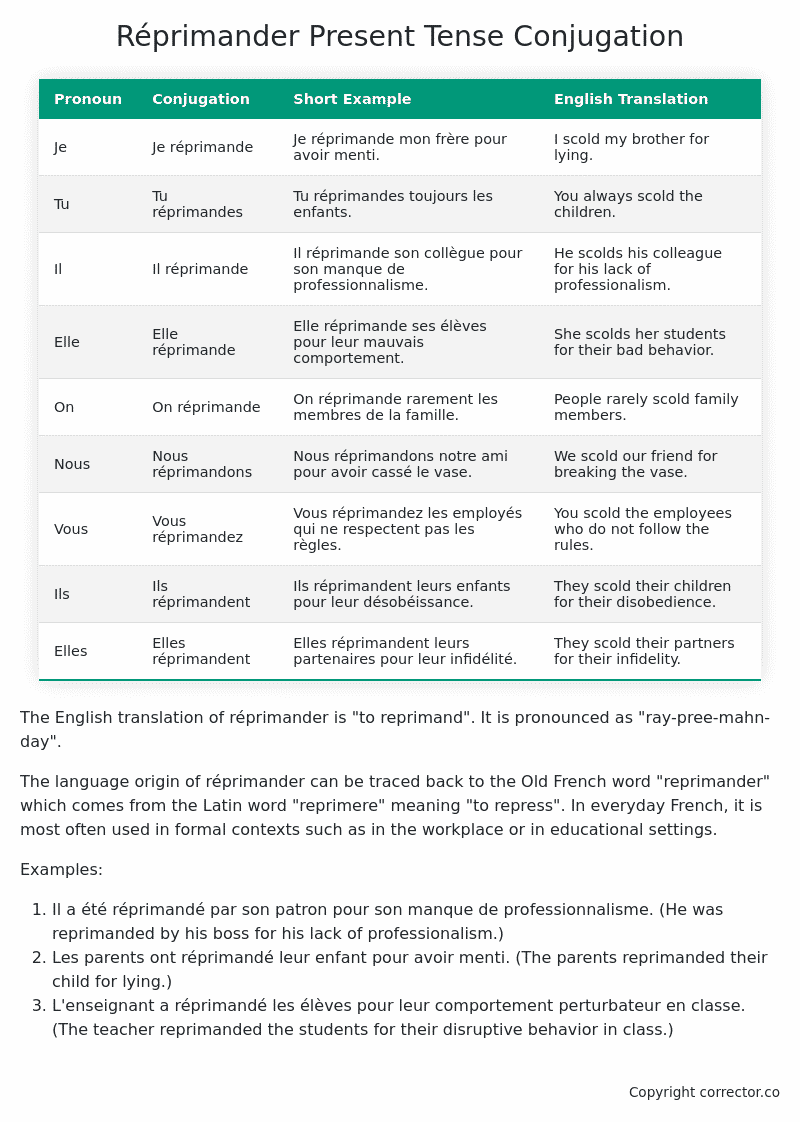Le Present (Present Tense) Conjugation of the French Verb réprimander
Introduction to the verb réprimander
The English translation of réprimander is “to reprimand”. It is pronounced as “ray-pree-mahn-day”.
The language origin of réprimander can be traced back to the Old French word “reprimander” which comes from the Latin word “reprimere” meaning “to repress”. In everyday French, it is most often used in formal contexts such as in the workplace or in educational settings.
Examples:
- Il a été réprimandé par son patron pour son manque de professionnalisme. (He was reprimanded by his boss for his lack of professionalism.)
- Les parents ont réprimandé leur enfant pour avoir menti. (The parents reprimanded their child for lying.)
- L’enseignant a réprimandé les élèves pour leur comportement perturbateur en classe. (The teacher reprimanded the students for their disruptive behavior in class.)
Réprimander – About the French Present Tense
To take a deep dive into all the French tenses then see our article on Mastering French Tense Conjugation.
Common Everyday Usage Patterns For Le Present
Interactions with Other Tenses
Table of the Present Tense Conjugation of réprimander
| Pronoun | Conjugation | Short Example | English Translation |
|---|---|---|---|
| Je | Je réprimande | Je réprimande mon frère pour avoir menti. | I scold my brother for lying. |
| Tu | Tu réprimandes | Tu réprimandes toujours les enfants. | You always scold the children. |
| Il | Il réprimande | Il réprimande son collègue pour son manque de professionnalisme. | He scolds his colleague for his lack of professionalism. |
| Elle | Elle réprimande | Elle réprimande ses élèves pour leur mauvais comportement. | She scolds her students for their bad behavior. |
| On | On réprimande | On réprimande rarement les membres de la famille. | People rarely scold family members. |
| Nous | Nous réprimandons | Nous réprimandons notre ami pour avoir cassé le vase. | We scold our friend for breaking the vase. |
| Vous | Vous réprimandez | Vous réprimandez les employés qui ne respectent pas les règles. | You scold the employees who do not follow the rules. |
| Ils | Ils réprimandent | Ils réprimandent leurs enfants pour leur désobéissance. | They scold their children for their disobedience. |
| Elles | Elles réprimandent | Elles réprimandent leurs partenaires pour leur infidélité. | They scold their partners for their infidelity. |
Other Conjugations for Réprimander.
Le Present (Present Tense) Conjugation of the French Verb réprimander (this article)
Imparfait (Imperfect) Tense Conjugation of the French Verb réprimander
Passé Simple (Simple Past) Tense Conjugation of the French Verb réprimander
Passé Composé (Present Perfect) Tense Conjugation of the French Verb réprimander
Futur Simple (Simple Future) Tense Conjugation of the French Verb réprimander
Futur Proche (Near Future) Tense Conjugation of the French Verb réprimander
Plus-que-parfait (Pluperfect) Tense Conjugation of the French Verb réprimander
Passé Antérieur (Past Anterior) Tense Conjugation of the French Verb réprimander
Futur Antérieur (Future Anterior) Tense Conjugation of the French Verb réprimander
Subjonctif Présent (Subjunctive Present) Tense Conjugation of the French Verb réprimander
Subjonctif Passé (Subjunctive Past) Tense Conjugation of the French Verb réprimander
Subjonctif Imparfait (Subjunctive Imperfect) Tense Conjugation of the French Verb réprimander
Conditionnel Présent (Conditional Present) Tense Conjugation of the French Verb réprimander
Conditionnel Passé (Conditional Past) Tense Conjugation of the French Verb réprimander
L’impératif Présent (Imperative Present) Tense Conjugation of the French Verb réprimander
L’infinitif Présent (Infinitive Present) Tense Conjugation of the French Verb réprimander
Struggling with French verbs or the language in general? Why not use our free French Grammar Checker – no registration required!
Get a FREE Download Study Sheet of this Conjugation 🔥
Simply right click the image below, click “save image” and get your free reference for the réprimander Present Tense tense conjugation!

I hope you enjoyed this article on the verb réprimander. Still in a learning mood? Check out another TOTALLY random French verb present conjugation!


